Key takeaways
- Targeted messaging on social media is crucial for engaging specific voter demographics, with different platforms requiring unique approaches.
- Micro-targeting and hyper-local strategies help create authentic connections with voters, significantly enhancing engagement in campaigns.
- Rapid-response techniques and the ability to adapt quickly to changing narratives are essential for maintaining campaign effectiveness.
- Measuring success goes beyond metrics, focusing on relational engagement and sentiment shifts to evaluate strategy impact.
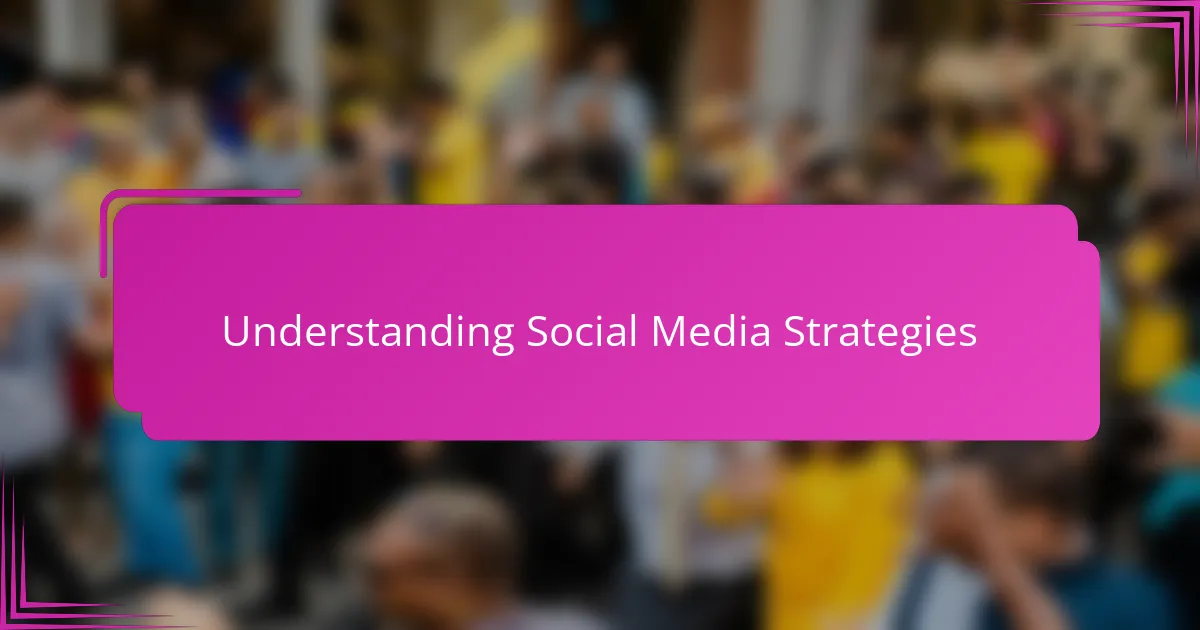
Understanding Social Media Strategies
Understanding social media strategies starts with recognizing the power of targeted messaging. In my experience, crafting content that resonates with specific voter demographics in Florida isn’t just about what you say but how and when you say it. Have you ever noticed how a well-timed post can ignite a wave of engagement? I have, and it’s truly a game-changer.
Beyond timing, the platform itself dictates the approach. From my observations, Facebook and Twitter demand different tones and tactics—Facebook audiences seem to appreciate detailed storytelling, while Twitter thrives on quick, impactful statements. This differentiation felt intuitive once I started tailoring content rather than using a one-size-fits-all method.
It’s also crucial to track and adapt quickly. Early on, I underestimated how fast trends shift on social media during a campaign, especially in a politically charged environment like Florida. Have you ever thought about how closely monitoring engagement can reveal voter sentiment almost in real-time? That insight alone can refine strategy and boost effectiveness massively.
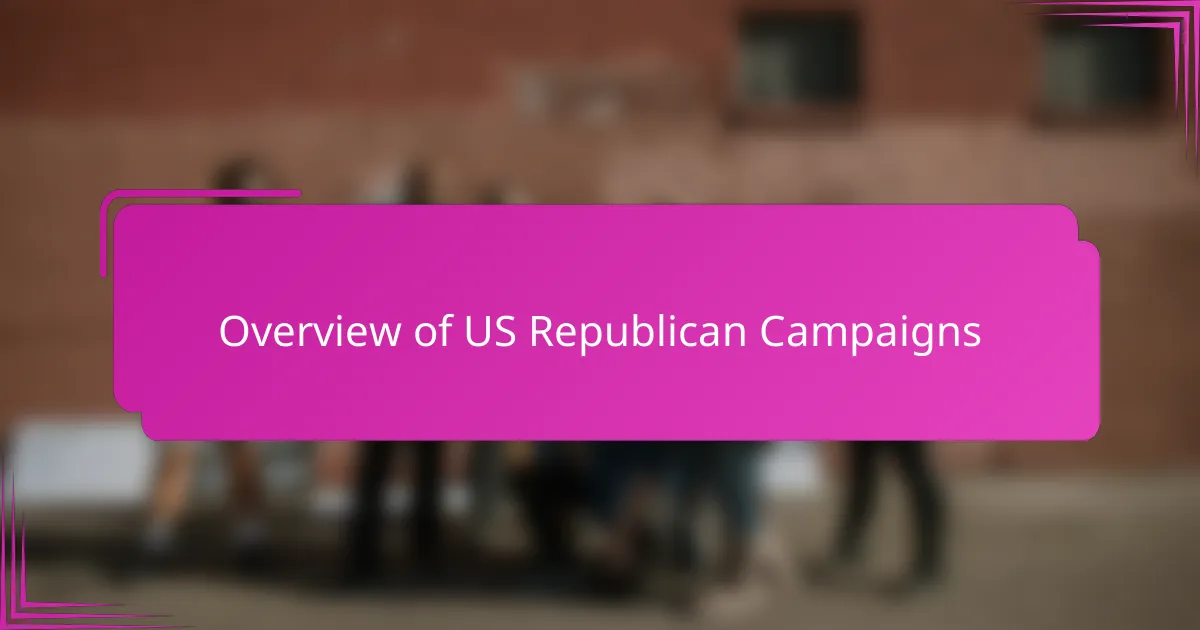
Overview of US Republican Campaigns
Republican campaigns in the US often hinge on clear, consistent messaging that appeals to their base while reaching undecided voters. From what I’ve seen, these campaigns emphasize values like economic growth, national security, and individual freedoms—messages that consistently resonate across diverse regions. But it’s not just the message; it’s the way campaigns localize those themes to fit the unique political landscape of each state.
In Florida, for example, Republican campaigns tend to focus heavily on issues like immigration and public safety, tailoring their social media content to reflect local concerns. I’ve noticed firsthand how campaigns that tap into these regional priorities tend to spark more meaningful engagement. Have you ever felt that connection when a campaign speaks directly to what matters most in your community? That’s the type of targeted approach these campaigns strive for.
Something else that struck me while observing these efforts was how quickly campaigns adapt to new challenges and opportunities. Whether it’s responding to a viral moment or shifting narratives after a debate, US Republican teams seem deeply agile. It’s almost like watching a well-oiled machine fine-tuning itself in real-time—something I find both impressive and a bit daunting to keep up with.
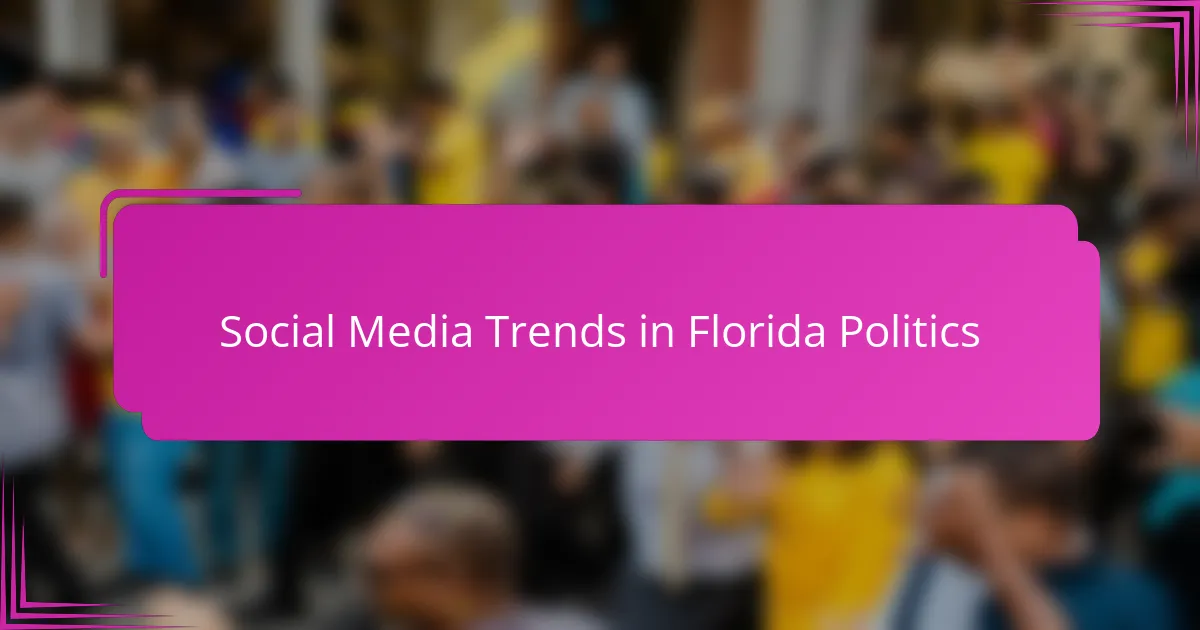
Social Media Trends in Florida Politics
In Florida politics, social media trends are evolving faster than I ever anticipated. One pattern I’ve noticed is how video content—especially short clips on platforms like Instagram and TikTok—has become essential for capturing attention. Have you ever caught yourself watching a quick, punchy political ad that stuck with you? That kind of engaging format is where Florida campaigns are doubling down.
Another trend that caught my eye is the growing importance of hyper-local targeting. Campaigns aren’t just sending out generic posts; they’re crafting messages unique to cities like Tampa or Miami Beach. From my experience, this localized strategy feels more authentic and helps build trust among voters who often feel overlooked.
Finally, I’ve seen how Florida’s social media campaigns skillfully blend traditional conservative themes with trending topics to stay relevant. It’s like watching a balancing act—acknowledging core values while navigating shifting public conversations. Do you think this mix helps campaigns connect better? In my view, it certainly keeps the message fresh and the audience engaged.
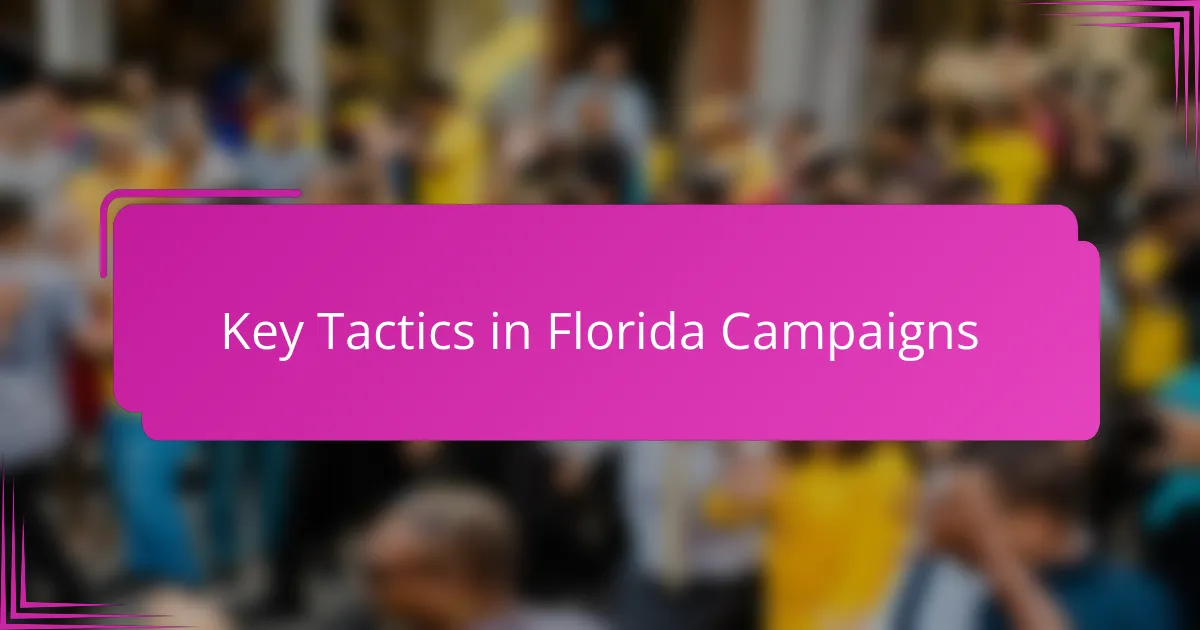
Key Tactics in Florida Campaigns
One key tactic I’ve observed in Florida campaigns is the laser focus on micro-targeting. It’s not just about broad strokes anymore; campaigns meticulously tailor messages down to neighborhoods or demographic slices. Have you ever noticed a political ad that seemed almost designed just for your community? That precision creates a sense of personal relevance that’s hard to ignore.
Another strategy that stood out to me was the heavy use of rapid-response teams on social media. When a narrative shifts or a competitor releases a new message, Florida campaigns are lightning-fast with counters or clarifications. I’ve sometimes marveled at how these quick pivots prevent misinformation from gaining traction and keep supporters energized.
Lastly, I can’t overstate how important storytelling proved to be in my Florida experiences. Sharing authentic, relatable stories about candidates or local issues made the campaigns feel more human. Do you think political content can sometimes feel too scripted? From where I stood, breaking that mold with genuine narratives made a huge difference in building trust and voter enthusiasm.
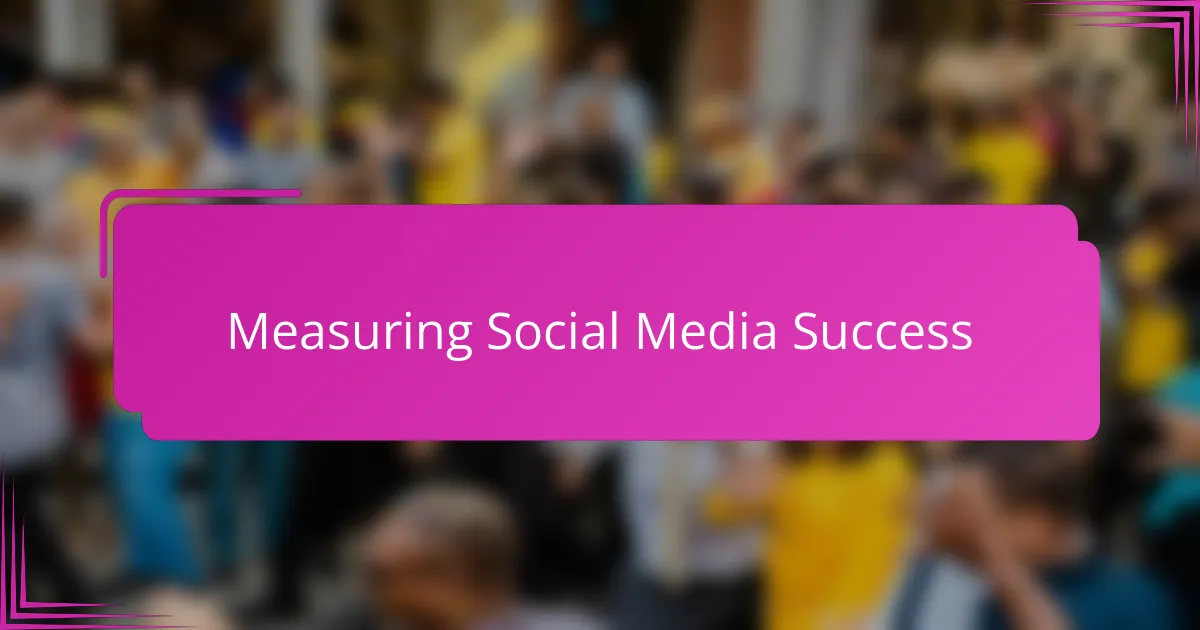
Measuring Social Media Success
Measuring success on social media isn’t just about counting likes or shares—though those numbers matter. In my experience, the real indicator lies in how these interactions translate into meaningful voter engagement and shifts in sentiment. Have you ever tracked a post and noticed how a surge in comments or messages revealed deeper interest or concerns? That’s when you know your strategy is striking a chord.
I’ve also found that setting clear, measurable goals upfront makes a huge difference. Whether it’s boosting event attendance or increasing issue-based conversations, having specific targets helps sharpen the focus. From what I observed in Florida campaigns, regularly reviewing analytics not only highlights what’s working but uncovers new opportunities to pivot quickly—something I came to rely on heavily during heated moments.
Sometimes, success feels more intangible, like sensing a shift in the online energy around a candidate or topic. I recall times when a simple tweet sparked a cascade of supportive responses that seemed to ripple far beyond the initial post. It’s moments like those that remind me social media is not just a metric but a dynamic conversation—and measuring that in real time can be both art and science.
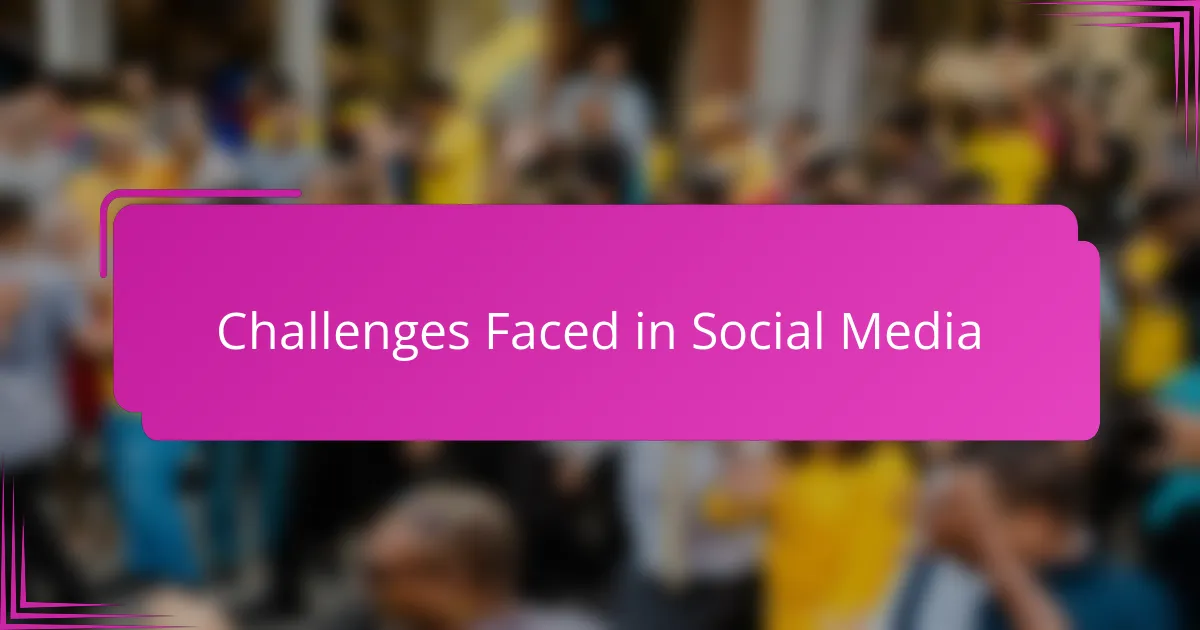
Challenges Faced in Social Media
Navigating social media for political campaigns in Florida wasn’t without its headaches. One challenge I consistently faced was combating the rapid spread of misinformation. It felt like trying to plug leaks in a dam—no matter how quickly my team responded, false narratives seemed to find new ways to resurface and confuse voters. Have you ever been frustrated by how a single misleading post can spiral out of control? I’ve lived that frustration firsthand.
Another difficulty came from the polarized nature of the audience. Engaging with supporters is one thing, but reaching undecided voters without alienating the base required a delicate balancing act. Sometimes, it felt like walking a tightrope; I had to constantly adjust messaging to avoid backlash. I often wondered, how do you share strong conservative principles while keeping the door open for dialogue? It’s a question that kept me on my toes.
Lastly, the sheer volume of data to sift through was overwhelming. Between tracking engagement metrics, sentiment analysis, and competitor activity, it was easy to get lost in numbers. Yet, ignoring these signals wasn’t an option if we wanted to stay relevant. I remember late nights pouring over dashboards, trying to decipher what voters truly cared about. Have you ever struggled to find meaningful insight amid a flood of information? That was a daily reality in my experience.

Lessons from My Florida Experience
One lesson that really stuck with me from my time in Florida is the power of flexibility. No matter how carefully you plan, social media landscapes shift overnight. I remember a moment when a single viral post upended days of preparation—forcing my team to rethink messaging on the fly. Have you ever had to pivot so quickly that it felt chaotic? That’s the reality in Florida politics.
I also learned the importance of authenticity. Voters in Florida respond deeply to genuine stories rather than rehearsed slogans. At one event, a candidate shared a personal story about community service, and the engagement skyrocketed. It made me realize that behind all the data and tactics, real human connection is what truly resonates.
Lastly, patience and persistence proved essential. Winning online conversations isn’t about quick wins—it’s about building trust over time. I often asked myself, how do you stay consistent in the face of negativity or slow progress? From what I experienced, steady effort paired with sincere messaging slowly changes hearts and minds in this fast-paced environment.